|
|
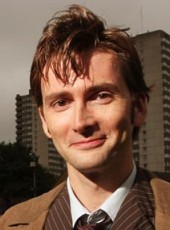 |
|
The
Tenth Doctor
(2005 - 2010) |
|
| |
|
|
|
The
Sound Vault |
|
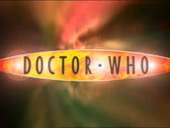 |
|
 |
|
| Martha Jones |
|
|
The Best Doctor
|
| |
| Vote
if I am your favourite Doctor |
|
|
|
|
|
 With the Ninth Doctor having returned the concept of Doctor Who to the screens of the general public for the first time in almost sixteen years, it was left to the Tenth Doctor to carry on the work he had begun and demonstrate the program’s full potential. Having expelled the energy of the Time Vortex from his body while simultaneously regenerating to save his life, the new Doctor found himself facing a companion who initially failed to believe his identity as The Doctor, subsequently causing the TARDIS to crash-land in London on Christmas Eve in a post-regenerative fit of insanity before collapsing into a coma himself ("The Christmas Invasion"). However, despite his weakened condition, the new Doctor quickly collected himself to confront the threat of a Sycorax invasion at the crucial moment, swiftly removing the Sycoraxs’ attempts to threaten Earth before challenging the Sycorax leader to a swordfight for Earth’s fate under the Sanctified Rules of Combat. Although he lost a hand in the confrontation, The Doctor re-grew the hand thanks to excess regenerative energy - due to him being in the first fifteen hours of his latest incarnation, the first time this ‘quirk’ of regeneration was demonstrated -, subsequently defeating the Sycorax and banishing them to space, renewing his eighth incarnation’s vow to defend Earth ("The Adventuress of Henrietta Street") as he informed them that the planet was defended. With the Ninth Doctor having returned the concept of Doctor Who to the screens of the general public for the first time in almost sixteen years, it was left to the Tenth Doctor to carry on the work he had begun and demonstrate the program’s full potential. Having expelled the energy of the Time Vortex from his body while simultaneously regenerating to save his life, the new Doctor found himself facing a companion who initially failed to believe his identity as The Doctor, subsequently causing the TARDIS to crash-land in London on Christmas Eve in a post-regenerative fit of insanity before collapsing into a coma himself ("The Christmas Invasion"). However, despite his weakened condition, the new Doctor quickly collected himself to confront the threat of a Sycorax invasion at the crucial moment, swiftly removing the Sycoraxs’ attempts to threaten Earth before challenging the Sycorax leader to a swordfight for Earth’s fate under the Sanctified Rules of Combat. Although he lost a hand in the confrontation, The Doctor re-grew the hand thanks to excess regenerative energy - due to him being in the first fifteen hours of his latest incarnation, the first time this ‘quirk’ of regeneration was demonstrated -, subsequently defeating the Sycorax and banishing them to space, renewing his eighth incarnation’s vow to defend Earth ("The Adventuress of Henrietta Street") as he informed them that the planet was defended.
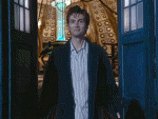 |
| The Christmas Invasion |
|
 In many ways, the Tenth Doctor made a significant contrast to his previous incarnation. While the Ninth Doctor could appear somewhat cold and distant, stating more than once that he ‘didn’t do domestic’, the Tenth Doctor demonstrated a far greater willingness to get involved with others, sharing Christmas dinner with Rose Tyler’s family ("The Christmas Invasion") and developing a more casually teasing relationship with Rose’s ex-boyfriend Mickey where his past self barely seemed able to remember Mickey’s name. His relations with other humans also improved; while the Ninth Doctor had regularly referred to humanity as ‘stupid apes’, often growing frustrated at their shortcomings and only briefly mentioning their successes, the Tenth spent a great deal of time praising humanity’s ingenuity and courage, prone to making passionate speeches about the value of human life and humanity’s remarkable spirit of exploration and determination, such as their attempts to learn the truth about the mysterious power source keeping a planet in exact orbit around a black hole ("The Impossible Planet/The Satan Pit") or their ability to survive all the way to the end of the universe ("Utopia"). Although his faith in humanity was briefly shaken by such encounters as a close call when he was apparently possessed by an unidentified alien life-form and nearly thrown out of a tour shuttle by the panicked passengers ("Midnight"), later encounters made it clear that The Doctor’s affection for the human race remained, The Doctor praising the intelligence of UNIT scientific advisor Professor Malcolm Taylor and showing a genuine appreciation for the normal lives of the people accompanying him after a bus he had been travelling in drove through a wormhole to another planet ("Planet of the Dead"). He subsequently showed obvious regret at the thought of leaving the staff of Bowie Base One - Earth’s first offworld colony - to die when he arrived there just before the date when the base would be destroyed, even though he knew it was necessary to preserve the timeline ("The Waters of Mars"). In many ways, the Tenth Doctor made a significant contrast to his previous incarnation. While the Ninth Doctor could appear somewhat cold and distant, stating more than once that he ‘didn’t do domestic’, the Tenth Doctor demonstrated a far greater willingness to get involved with others, sharing Christmas dinner with Rose Tyler’s family ("The Christmas Invasion") and developing a more casually teasing relationship with Rose’s ex-boyfriend Mickey where his past self barely seemed able to remember Mickey’s name. His relations with other humans also improved; while the Ninth Doctor had regularly referred to humanity as ‘stupid apes’, often growing frustrated at their shortcomings and only briefly mentioning their successes, the Tenth spent a great deal of time praising humanity’s ingenuity and courage, prone to making passionate speeches about the value of human life and humanity’s remarkable spirit of exploration and determination, such as their attempts to learn the truth about the mysterious power source keeping a planet in exact orbit around a black hole ("The Impossible Planet/The Satan Pit") or their ability to survive all the way to the end of the universe ("Utopia"). Although his faith in humanity was briefly shaken by such encounters as a close call when he was apparently possessed by an unidentified alien life-form and nearly thrown out of a tour shuttle by the panicked passengers ("Midnight"), later encounters made it clear that The Doctor’s affection for the human race remained, The Doctor praising the intelligence of UNIT scientific advisor Professor Malcolm Taylor and showing a genuine appreciation for the normal lives of the people accompanying him after a bus he had been travelling in drove through a wormhole to another planet ("Planet of the Dead"). He subsequently showed obvious regret at the thought of leaving the staff of Bowie Base One - Earth’s first offworld colony - to die when he arrived there just before the date when the base would be destroyed, even though he knew it was necessary to preserve the timeline ("The Waters of Mars").
 With his improved opinion of humanity, it is also to be noted that this Doctor was the most human Doctor of them all. While all Doctors had been close to their companions in the past, this Doctor’s relationships with his friends was far closer and more physically expressive, regularly hugging his companions in celebration after some narrow escape. On at least three occasions he was actually kissed by various women shortly after meeting them, a degree of interest that he had never before attracted in his previous incarnations (Although the kiss was initiated by the women in all cases, it is important to note that The Doctor didn’t pull away as he might have done in previous bodies). In further contrast to his ninth self’s refusal to discuss his early history, the Tenth Doctor also appeared more nostalgic for his past, once giving himself the alias of ‘Doctor James McCrimmon’ after his second incarnation’s old companion Jamie McCrimmon ("Tooth and Claw") and nicknaming a dodo he and current companion Martha Jones rescued from an obsessed collector ‘Dorothea’ after his first incarnation’s companion Dodo Chaplet ("The Last Dodo") (Although on neither occasion did he mention where the names came from). During a brief meeting with his fifth incarnation, the Tenth Doctor told his younger self before they parted ways that he regarded the Fifth Doctor as his favourite past self, describing the Fifth Doctor as the point when he stopped trying to be old and important and simply allowed himself to have some fun as he travelled around in the TARDIS, even noting elements of his own clothing that he had assumed from the Fifth Doctor such as his trainers and ‘brainy specs’ (Suggesting that neither Doctor actually needed to wear glasses but wears them to look smarter) ("Time Crash"). With his improved opinion of humanity, it is also to be noted that this Doctor was the most human Doctor of them all. While all Doctors had been close to their companions in the past, this Doctor’s relationships with his friends was far closer and more physically expressive, regularly hugging his companions in celebration after some narrow escape. On at least three occasions he was actually kissed by various women shortly after meeting them, a degree of interest that he had never before attracted in his previous incarnations (Although the kiss was initiated by the women in all cases, it is important to note that The Doctor didn’t pull away as he might have done in previous bodies). In further contrast to his ninth self’s refusal to discuss his early history, the Tenth Doctor also appeared more nostalgic for his past, once giving himself the alias of ‘Doctor James McCrimmon’ after his second incarnation’s old companion Jamie McCrimmon ("Tooth and Claw") and nicknaming a dodo he and current companion Martha Jones rescued from an obsessed collector ‘Dorothea’ after his first incarnation’s companion Dodo Chaplet ("The Last Dodo") (Although on neither occasion did he mention where the names came from). During a brief meeting with his fifth incarnation, the Tenth Doctor told his younger self before they parted ways that he regarded the Fifth Doctor as his favourite past self, describing the Fifth Doctor as the point when he stopped trying to be old and important and simply allowed himself to have some fun as he travelled around in the TARDIS, even noting elements of his own clothing that he had assumed from the Fifth Doctor such as his trainers and ‘brainy specs’ (Suggesting that neither Doctor actually needed to wear glasses but wears them to look smarter) ("Time Crash").
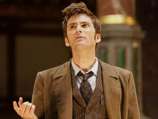 |
| The Shakespeare Code |
|
 Also unlike previous incarnations, whose tastes in entertainment tended to focus on the older styles of writing and art, the Tenth Doctor, while retaining an interest in classical writers such as Shakespeare ("The Shakespeare Code") or Agatha Christie ("The Unicorn and the Wasp"), regularly expressed an interest in more modern popular culture, unintentionally quoting The Lion King shortly after his regeneration ("The Christmas Invasion"), as well as commenting that he cried after reading Harry Potter and the Deathly Hallows, later using Back to the Future as an example of the complexities involved in changing history ("The Shakespeare Code"). He was also far more vocally expressive about his appreciation for the various locations he found himself visiting, to the extent that he actually tried to travel to locations for specific holiday purposes rather than simply wandering around at random. On one occasion he made an active effort to visit an alien castle when it had become a tourist attraction rather than when it was in active use (Although he still got the dates wrong in the end) ("Martha in the Mirror"), while on another occasion he commented that he enjoyed Easter as he so rarely managed to be present for it due to the lack of a specific date when it was celebrated ("Planet of the Dead"). However, most of the time he preferred to visit locations during their relative peak; when The Doctor took Donna to visit the underwater city of Vallarasee, he was disappointed at how it had basically become a tourist attraction where the natives needed to wear water masks in their own city, when during his previous visit the Vallarasseans were in charge and The Doctor had to swim down to the city himself ("One Mile Down"). Also unlike previous incarnations, whose tastes in entertainment tended to focus on the older styles of writing and art, the Tenth Doctor, while retaining an interest in classical writers such as Shakespeare ("The Shakespeare Code") or Agatha Christie ("The Unicorn and the Wasp"), regularly expressed an interest in more modern popular culture, unintentionally quoting The Lion King shortly after his regeneration ("The Christmas Invasion"), as well as commenting that he cried after reading Harry Potter and the Deathly Hallows, later using Back to the Future as an example of the complexities involved in changing history ("The Shakespeare Code"). He was also far more vocally expressive about his appreciation for the various locations he found himself visiting, to the extent that he actually tried to travel to locations for specific holiday purposes rather than simply wandering around at random. On one occasion he made an active effort to visit an alien castle when it had become a tourist attraction rather than when it was in active use (Although he still got the dates wrong in the end) ("Martha in the Mirror"), while on another occasion he commented that he enjoyed Easter as he so rarely managed to be present for it due to the lack of a specific date when it was celebrated ("Planet of the Dead"). However, most of the time he preferred to visit locations during their relative peak; when The Doctor took Donna to visit the underwater city of Vallarasee, he was disappointed at how it had basically become a tourist attraction where the natives needed to wear water masks in their own city, when during his previous visit the Vallarasseans were in charge and The Doctor had to swim down to the city himself ("One Mile Down").
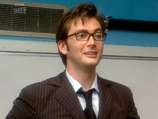 |
| School Reunion |
|
 Despite his seemingly greater humanity, this Doctor could also appear chillingly alien when facing his enemies, describing himself shortly after his regeneration as a man who offered ‘No second chances’ ("The Christmas Invasion"); when confronting the leader of The Krillitane invasion ("School Reunion"), The Doctor coldly informed his foe that he had lost most of his former mercy due to his old age, giving the Krillitanes one chance to leave before he destroyed them. This idea of The Doctor showing cold contempt for his enemies continued for most of his life, being particularly evident when The Doctor destroyed the last of the vicious omnivorous race known as the Racnoss by drowning them in the Thames even as the Empress of the Racnoss screamed for him to stop killing her children ("The Runaway Bride") - although it should be noted that Racnoss are born starving and were known to devour whole planets to survive -, or when he condemned The Family of Blood to eternal imprisonment after they attempted to steal his DNA to restore themselves ("Human Nature/The Family of Blood"). Despite his seemingly greater humanity, this Doctor could also appear chillingly alien when facing his enemies, describing himself shortly after his regeneration as a man who offered ‘No second chances’ ("The Christmas Invasion"); when confronting the leader of The Krillitane invasion ("School Reunion"), The Doctor coldly informed his foe that he had lost most of his former mercy due to his old age, giving the Krillitanes one chance to leave before he destroyed them. This idea of The Doctor showing cold contempt for his enemies continued for most of his life, being particularly evident when The Doctor destroyed the last of the vicious omnivorous race known as the Racnoss by drowning them in the Thames even as the Empress of the Racnoss screamed for him to stop killing her children ("The Runaway Bride") - although it should be noted that Racnoss are born starving and were known to devour whole planets to survive -, or when he condemned The Family of Blood to eternal imprisonment after they attempted to steal his DNA to restore themselves ("Human Nature/The Family of Blood").
 Thanks to the influence of companions such as Donna Noble and Martha Jones, however, The Doctor became more humane over time, attempting to save The Master rather than allowing him to be executed for his crimes (Although The Master allowed himself to die to hurt The Doctor after he was shot rather than allowing himself to regenerate) ("Utopia", "The Sound of Drums/Last of the Time Lords"), leaving the newborn Adipose to depart Earth in peace as he recognised they weren’t to blame for the circumstances of their birth ("Partners in Crime"), and proving unwilling to destroy a Sontaran ship despite the knowledge that they would decimate Earth if he did nothing ("The Sontaran Stratagem/The Poison Sky"). His commitment to saving the day was later noted by his eleventh incarnation’s companion Clara Oswald when the Tenth Doctor met his eleventh incarnation and the ‘War Doctor’ (The Doctor who fought in the Time War, his existence ignored by later incarnations due to their shame at his actions), Clara describing the Tenth Doctor as a hero where the War Doctor was just a warrior (Although she commented that ‘any idiot can be a hero’) while reaffirming her belief that the Eleventh Doctor was fundamentally a doctor first ("The Day of The Doctor"). Thanks to the influence of companions such as Donna Noble and Martha Jones, however, The Doctor became more humane over time, attempting to save The Master rather than allowing him to be executed for his crimes (Although The Master allowed himself to die to hurt The Doctor after he was shot rather than allowing himself to regenerate) ("Utopia", "The Sound of Drums/Last of the Time Lords"), leaving the newborn Adipose to depart Earth in peace as he recognised they weren’t to blame for the circumstances of their birth ("Partners in Crime"), and proving unwilling to destroy a Sontaran ship despite the knowledge that they would decimate Earth if he did nothing ("The Sontaran Stratagem/The Poison Sky"). His commitment to saving the day was later noted by his eleventh incarnation’s companion Clara Oswald when the Tenth Doctor met his eleventh incarnation and the ‘War Doctor’ (The Doctor who fought in the Time War, his existence ignored by later incarnations due to their shame at his actions), Clara describing the Tenth Doctor as a hero where the War Doctor was just a warrior (Although she commented that ‘any idiot can be a hero’) while reaffirming her belief that the Eleventh Doctor was fundamentally a doctor first ("The Day of The Doctor").
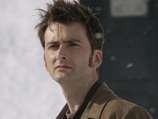 |
| Planet of the Ood |
|
 Even as The Doctor’s ruthlessness mellowed over time, his alien nature remained particularly clear through some of the methods he used to find out important information. Although previous Doctors had displayed some level of telepathy in the past, such as when the Second Doctor and the Third Doctor had engaged in a telepathic conference while pitted against Omega ("The Three Doctors") or the Seventh Doctor knocked out Mordred simply by placing his fingers to Mordred’s forehead ("Battlefield"), the Tenth Doctor used his telepathic abilities on a far more regular basis. The earliest example of this was when he examined the mind of Reinette - a little girl who would become Madame de Pompadaur in her future - to learn why a clockwork robot had travelled across three thousand years and two galaxies simply to find her ("The Girl in the Fireplace"), later occasions seeing him telepathically questioning an Isolus - a space-dwelling being using a little girl as a host - ("Fear Her"), the catatonically-insane architect of the Globe Theatre ("The Shakespeare Code"), and the unusual telepathic race known as the Ood ("Planet of the Ood"), as well as hypnotising a man called Baris - a long-time fan of his from the future - to believe that he was The Doctor as part of The Doctor’s plan to outwit the ruthless Sebastiene’s attempt to use him as the prey in a hunt ("The Doctor Trap"). The most notable use of his telepathic abilities occurred when he was held captive by The Master as his old friend took control of Earth and captured The Doctor, simultaneously artificially aging him so that he was physically a thousand. Taking advantage of a telepathic network The Master had created, The Doctor’s companion Martha Jones travelled Earth for a year to tell the human race about The Doctor, The Doctor subsequently drawing on humanity’s faith in him to rejuvenate himself, having spent that same year tapping into the Archangel Network so that he could draw on the resulting mental energy of humanity’s ‘prayer’ ("The Sound of Drums/Last of the Time Lords"). Even as The Doctor’s ruthlessness mellowed over time, his alien nature remained particularly clear through some of the methods he used to find out important information. Although previous Doctors had displayed some level of telepathy in the past, such as when the Second Doctor and the Third Doctor had engaged in a telepathic conference while pitted against Omega ("The Three Doctors") or the Seventh Doctor knocked out Mordred simply by placing his fingers to Mordred’s forehead ("Battlefield"), the Tenth Doctor used his telepathic abilities on a far more regular basis. The earliest example of this was when he examined the mind of Reinette - a little girl who would become Madame de Pompadaur in her future - to learn why a clockwork robot had travelled across three thousand years and two galaxies simply to find her ("The Girl in the Fireplace"), later occasions seeing him telepathically questioning an Isolus - a space-dwelling being using a little girl as a host - ("Fear Her"), the catatonically-insane architect of the Globe Theatre ("The Shakespeare Code"), and the unusual telepathic race known as the Ood ("Planet of the Ood"), as well as hypnotising a man called Baris - a long-time fan of his from the future - to believe that he was The Doctor as part of The Doctor’s plan to outwit the ruthless Sebastiene’s attempt to use him as the prey in a hunt ("The Doctor Trap"). The most notable use of his telepathic abilities occurred when he was held captive by The Master as his old friend took control of Earth and captured The Doctor, simultaneously artificially aging him so that he was physically a thousand. Taking advantage of a telepathic network The Master had created, The Doctor’s companion Martha Jones travelled Earth for a year to tell the human race about The Doctor, The Doctor subsequently drawing on humanity’s faith in him to rejuvenate himself, having spent that same year tapping into the Archangel Network so that he could draw on the resulting mental energy of humanity’s ‘prayer’ ("The Sound of Drums/Last of the Time Lords").
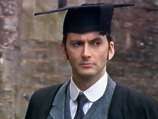 |
| Human Nature/The Family of
Blood |
|
 As a further example of his alien nature, this Doctor could also display a surprising mixture of emotional attachment and detachment. While it was implied that he was in love with his ninth incarnation’s companion Rose Tyler, spending a great deal of time mourning her loss after she was trapped in a parallel world ("The Runaway Bride", "Smith and Jones"), he never expressly told her how he felt, being too late to say it during what might have been their last conversation ("Army of Ghosts/Doomsday") and avoiding the opportunity to voice his feelings again during their next meeting ("The Stolen Earth/Journey's End") (Although his clone apparently said the words in his place). His feelings for Rose also resulted in him sometimes unintentionally hurting his next companion Martha Jones despite her own feelings for him as he was unable to get past his pain at Rose’s loss, although he was still clearly fond of Martha as a friend. When he briefly turned himself into a human to escape The Family of Blood - a race of non-corporeal beings seeking Time Lord DNA to create new bodies and lives for themselves -, his human personality was relatively unchanged from his own barring ‘John Smith’ conforming to the standards and prejudices of the time he was in, such as his slight racism towards his companion and his willingness to use weapons, where the Seventh’s Smith ("Human Nature") was drastically different from The Doctor personality-wise in such details as his views on relationships but clearly retained The Doctor’s core beliefs about violence. The most obvious example of this was shown when The Doctor forgot to take the possibility that his human identity might fall in love into account because it simply never occurred to him ("Human Nature/The Family of Blood"). As a further example of his alien nature, this Doctor could also display a surprising mixture of emotional attachment and detachment. While it was implied that he was in love with his ninth incarnation’s companion Rose Tyler, spending a great deal of time mourning her loss after she was trapped in a parallel world ("The Runaway Bride", "Smith and Jones"), he never expressly told her how he felt, being too late to say it during what might have been their last conversation ("Army of Ghosts/Doomsday") and avoiding the opportunity to voice his feelings again during their next meeting ("The Stolen Earth/Journey's End") (Although his clone apparently said the words in his place). His feelings for Rose also resulted in him sometimes unintentionally hurting his next companion Martha Jones despite her own feelings for him as he was unable to get past his pain at Rose’s loss, although he was still clearly fond of Martha as a friend. When he briefly turned himself into a human to escape The Family of Blood - a race of non-corporeal beings seeking Time Lord DNA to create new bodies and lives for themselves -, his human personality was relatively unchanged from his own barring ‘John Smith’ conforming to the standards and prejudices of the time he was in, such as his slight racism towards his companion and his willingness to use weapons, where the Seventh’s Smith ("Human Nature") was drastically different from The Doctor personality-wise in such details as his views on relationships but clearly retained The Doctor’s core beliefs about violence. The most obvious example of this was shown when The Doctor forgot to take the possibility that his human identity might fall in love into account because it simply never occurred to him ("Human Nature/The Family of Blood").
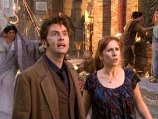 |
| The Fires of Pompeii |
|
 This emotional ignorance also resulted in The Doctor being put in a very awkward position when he proposed to Elizabeth I as part of a plan to try and expose a Zygon plot to invade Earth, only to learn that he had actually proposed to the real Elizabeth (He had assumed that she would reject the proposal due to the short amount of time they had spent together), forcing him to marry her as part of his plan to stop the Zygons ("The Day of The Doctor"), resulting in Elizabeth declaring The Doctor her sworn enemy ("The Shakespeare Code") for having left her alone in a glade when they were planning to elope ("The Wedding of River Song"). Despite his emotional ignorance, The Doctor also demonstrated his own emotional pain on a larger scale when he revealed that he was unable to get involved in some situations due to them being fixed points in time - such as Pompeii ("The Fires of Pompeii") or the explosion of Bowie Base One on Mars ("The Waters of Mars") - no matter how he might become personally invested in events, his status as a Time Lord leaving him aware of when he can or cannot influence the outcome of events for more reasons than the events simply being recorded history (Although he attempted to alter events at a fixed point in time during "The Waters of Mars" after becoming too personally involved in the crisis). This emotional ignorance also resulted in The Doctor being put in a very awkward position when he proposed to Elizabeth I as part of a plan to try and expose a Zygon plot to invade Earth, only to learn that he had actually proposed to the real Elizabeth (He had assumed that she would reject the proposal due to the short amount of time they had spent together), forcing him to marry her as part of his plan to stop the Zygons ("The Day of The Doctor"), resulting in Elizabeth declaring The Doctor her sworn enemy ("The Shakespeare Code") for having left her alone in a glade when they were planning to elope ("The Wedding of River Song"). Despite his emotional ignorance, The Doctor also demonstrated his own emotional pain on a larger scale when he revealed that he was unable to get involved in some situations due to them being fixed points in time - such as Pompeii ("The Fires of Pompeii") or the explosion of Bowie Base One on Mars ("The Waters of Mars") - no matter how he might become personally invested in events, his status as a Time Lord leaving him aware of when he can or cannot influence the outcome of events for more reasons than the events simply being recorded history (Although he attempted to alter events at a fixed point in time during "The Waters of Mars" after becoming too personally involved in the crisis).
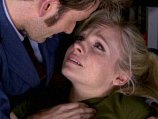 |
| The Doctor's Daughter |
|
 Even in his darkest moments, however, The Doctor’s compassion for others remained evident. This was most keenly displayed in his reaction to the discovery that his old enemy The Master - who he believed had perished in the Time War along with every other Time Lord - was still alive ("Utopia"); despite the long history of animosity between the two, The Doctor was nevertheless grateful to learn that another Time Lord still existed in the universe, and his grief when The Master prevented himself from regenerating after being shot in order to hurt The Doctor was particularly evident, even after The Master had tortured him for the past year while forcing him to watch as The Master enslaved humanity ("The Sound of Drums/Last of the Time Lords"). Despite the brevity of his time with her, the loss of his genetically-generated ‘daughter’ Jenny had an equally great impact on him, The Doctor evidently mourning all the chances that had been lost for the two of them to explore their relationship as she died in his arms, appearing briefly tempted to shoot her killer before he coldly informed the man that he would never cross that line ("The Doctor's Daughter"). He also demonstrated a great compassion for the mysterious race known as the Ood, working to investigate the reasons for their status as an apparent ‘slave race’ ("Planet of the Ood") despite the fact that the Ood had nearly killed him and his friends on their first meeting ("The Impossible Planet/The Satan Pit"). Even in his darkest moments, however, The Doctor’s compassion for others remained evident. This was most keenly displayed in his reaction to the discovery that his old enemy The Master - who he believed had perished in the Time War along with every other Time Lord - was still alive ("Utopia"); despite the long history of animosity between the two, The Doctor was nevertheless grateful to learn that another Time Lord still existed in the universe, and his grief when The Master prevented himself from regenerating after being shot in order to hurt The Doctor was particularly evident, even after The Master had tortured him for the past year while forcing him to watch as The Master enslaved humanity ("The Sound of Drums/Last of the Time Lords"). Despite the brevity of his time with her, the loss of his genetically-generated ‘daughter’ Jenny had an equally great impact on him, The Doctor evidently mourning all the chances that had been lost for the two of them to explore their relationship as she died in his arms, appearing briefly tempted to shoot her killer before he coldly informed the man that he would never cross that line ("The Doctor's Daughter"). He also demonstrated a great compassion for the mysterious race known as the Ood, working to investigate the reasons for their status as an apparent ‘slave race’ ("Planet of the Ood") despite the fact that the Ood had nearly killed him and his friends on their first meeting ("The Impossible Planet/The Satan Pit").
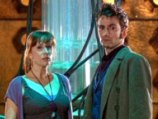 |
| Silence in the Library/Forest
of the Dead |
|
 As with some of his previous incarnations, The Doctor also displayed a certain casual arrogance more than once. Apparently due to his position as the last Time Lord - a prophecy he encountered about himself in this incarnation even referred to him as the 'Lonely God' -, The Doctor was also seemingly more aware of and willing to use his status against his enemies, prematurely ending the career of Prime Minister Harriet Jones after she destroyed a retreating alien ship despite history recording her as lasting for three terms ("The Christmas Invasion"), stating that he had 'earned the right' to speak for humanity during the Sontaran invasion ("The Sontaran Strategem/The Poison Sky"), and convincing the living darkness known as the Vashta Nerada to allow him to save everyone in the Library - a vast library that spanned an entire planet - by challenging them to look him up, the Vashta Nerada consulting the library's databanks and subsequently giving The Doctor a day to deal with the situation rather than attempting to kill him outright ("Silence in the Library/Forest of the Dead"). This arrogance was further reflected in his attitude towards regeneration; where previous incarnations accepted regeneration as a necessity after the First Doctor accepted the need to change ("The Man in the Velvet Mask" and "The Tenth Planet"), the Tenth Doctor not only claimed to regard regeneration as death rather than life as it 'killed' everything he was at present ("The End of Time"), but actually sacrificed one of his regenerations while avoiding changing his appearance by channelling the energy that would have changed his appearance into his severed hand ("The Stolen Earth/Journey's End") (Although it could be argued that the scale of the current crisis meant that The Doctor took such action so that he wouldn't have to cope with post-regenerative trauma while trying to stop the Daleks). As with some of his previous incarnations, The Doctor also displayed a certain casual arrogance more than once. Apparently due to his position as the last Time Lord - a prophecy he encountered about himself in this incarnation even referred to him as the 'Lonely God' -, The Doctor was also seemingly more aware of and willing to use his status against his enemies, prematurely ending the career of Prime Minister Harriet Jones after she destroyed a retreating alien ship despite history recording her as lasting for three terms ("The Christmas Invasion"), stating that he had 'earned the right' to speak for humanity during the Sontaran invasion ("The Sontaran Strategem/The Poison Sky"), and convincing the living darkness known as the Vashta Nerada to allow him to save everyone in the Library - a vast library that spanned an entire planet - by challenging them to look him up, the Vashta Nerada consulting the library's databanks and subsequently giving The Doctor a day to deal with the situation rather than attempting to kill him outright ("Silence in the Library/Forest of the Dead"). This arrogance was further reflected in his attitude towards regeneration; where previous incarnations accepted regeneration as a necessity after the First Doctor accepted the need to change ("The Man in the Velvet Mask" and "The Tenth Planet"), the Tenth Doctor not only claimed to regard regeneration as death rather than life as it 'killed' everything he was at present ("The End of Time"), but actually sacrificed one of his regenerations while avoiding changing his appearance by channelling the energy that would have changed his appearance into his severed hand ("The Stolen Earth/Journey's End") (Although it could be argued that the scale of the current crisis meant that The Doctor took such action so that he wouldn't have to cope with post-regenerative trauma while trying to stop the Daleks).
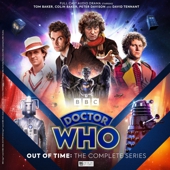 |
Out of Time
(Matt Fitton, Lisa McMullin and David Llewellyn) |
|
 Despite this arrogance, he never lost his appreciation for the ordinary people he encountered in his travels, once informing the insane Professor Richard Lazarus that there was no such thing as an ordinary human as everyone was unique and incredible in their own way ("The Lazarus Experiment"). Interestingly, despite this darker view of regeneration, he seemed to have a good view of his other selves during his own multi-incarnation encounters. While his interaction with the Fourth Doctor was tense when they met in the Cathedral of Contemplation during a Dalek invasion ("Out of Time"), this can be attributed to the Tenth ‘blaming’ the Fourth for not stopping the Daleks at their birth - thus potentially indirectly causing the Time War - rather than any issues with the Fourth as a person. By contrast, the Tenth quickly established a more even dynamic with the Fifth Doctor and the Sixth Doctor when they worked together against the Cybermen ("Out of Time 2 - The Gates of Hell") and the Weeping Angels ("Out of Time 3 - Wink"), The Doctors easily working together to thwart the temporally complex events that led to these enemies being such a threat, even if the Sixth in particular expressed frustration at the Tenth’s constant talking where the Sixth felt he was more careful with his words. Despite this arrogance, he never lost his appreciation for the ordinary people he encountered in his travels, once informing the insane Professor Richard Lazarus that there was no such thing as an ordinary human as everyone was unique and incredible in their own way ("The Lazarus Experiment"). Interestingly, despite this darker view of regeneration, he seemed to have a good view of his other selves during his own multi-incarnation encounters. While his interaction with the Fourth Doctor was tense when they met in the Cathedral of Contemplation during a Dalek invasion ("Out of Time"), this can be attributed to the Tenth ‘blaming’ the Fourth for not stopping the Daleks at their birth - thus potentially indirectly causing the Time War - rather than any issues with the Fourth as a person. By contrast, the Tenth quickly established a more even dynamic with the Fifth Doctor and the Sixth Doctor when they worked together against the Cybermen ("Out of Time 2 - The Gates of Hell") and the Weeping Angels ("Out of Time 3 - Wink"), The Doctors easily working together to thwart the temporally complex events that led to these enemies being such a threat, even if the Sixth in particular expressed frustration at the Tenth’s constant talking where the Sixth felt he was more careful with his words.
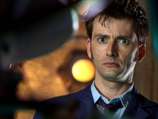 |
| The Waters of Mars |
|
 The Doctor was given an uncomfortable view of his arrogance during his last televised encounter with the Daleks - which included the resurrection of Davros ("The Stolen Earth/Journey's End") and his own near-regeneration after being shot by a Dalek -, Davros confronting him with his past companions’ actions as Sarah Jane Smith, Captain Jack Harkness and Martha Jones all threatened to destroy the Dalek Crucible or Earth to stop the Daleks triggering the Reality Bomb. Although The Doctor defended them on the grounds that they were trying to stop the Daleks, Davros coldly taunted The Doctor that he refused to carry weapons while turning his companions into soldiers and allowing innocents to die in his name, a claim that was apparently further reinforced when a duplicate of The Doctor - created when he averted his regeneration by channelling the regenerative energy into his previously-lost hand, allowing the hand to ‘grow’ into a new Doctor after being energised by contact with The Doctor’s current companion Donna - destroyed the Dalek army by triggering their self-destruct systems. During his visit to Bowie Base One, the first Earth colony on Mars, on the very day of its destruction, The Doctor became so caught up in events that he saved three of the colonists who would have died in the explosion despite their deaths being a fixed point in time, defending his actions on the grounds that his status as the last Time Lord allowed him to ‘rewrite’ the old Laws of Time, until one of the colonists that he had become friends with shot herself in order to ensure that the consequences of her death - including her granddaughter piloting Earth’s first faster-than-light ship in her memory - remained unchanged ("The Waters of Mars"). The Doctor was given an uncomfortable view of his arrogance during his last televised encounter with the Daleks - which included the resurrection of Davros ("The Stolen Earth/Journey's End") and his own near-regeneration after being shot by a Dalek -, Davros confronting him with his past companions’ actions as Sarah Jane Smith, Captain Jack Harkness and Martha Jones all threatened to destroy the Dalek Crucible or Earth to stop the Daleks triggering the Reality Bomb. Although The Doctor defended them on the grounds that they were trying to stop the Daleks, Davros coldly taunted The Doctor that he refused to carry weapons while turning his companions into soldiers and allowing innocents to die in his name, a claim that was apparently further reinforced when a duplicate of The Doctor - created when he averted his regeneration by channelling the regenerative energy into his previously-lost hand, allowing the hand to ‘grow’ into a new Doctor after being energised by contact with The Doctor’s current companion Donna - destroyed the Dalek army by triggering their self-destruct systems. During his visit to Bowie Base One, the first Earth colony on Mars, on the very day of its destruction, The Doctor became so caught up in events that he saved three of the colonists who would have died in the explosion despite their deaths being a fixed point in time, defending his actions on the grounds that his status as the last Time Lord allowed him to ‘rewrite’ the old Laws of Time, until one of the colonists that he had become friends with shot herself in order to ensure that the consequences of her death - including her granddaughter piloting Earth’s first faster-than-light ship in her memory - remained unchanged ("The Waters of Mars").
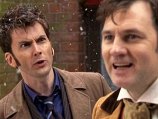 |
| The Next Doctor |
|
 Despite his initial enthusiasm in this incarnation, The Doctor became increasingly melancholy in his later years, even deliberately avoiding taking on further companions after the circumstances of Donna and Rose’s departures left him heartbroken - Rose living out her life in a parallel world with his ‘clone’ while Donna’s memory of her travels with him were erased to save her life -, despite Sarah and Martha reminding him that his other past companions remained his family. Regardless of this desire for solitude, he continued to develop strong bonds with those he met on his travels; one of his most interesting friendships was with nineteenth-century mathematics professor Jackson Lake, who briefly became convinced that he was The Doctor after exposure to an infostamp containing information about The Doctor’s life that the Cybermen had acquired from the Daleks’ databanks ("The Next Doctor"). On another occasion he formed a strong friendship with aristocrat-turned-cat-burglar Lady Christina de Souza, working with her to save a group of people on a bus that accidentally went through a wormhole to another planet that had been generated by a race of manta-ray-like aliens - Christina even kissing him after the bus returned to Earth -, but in the end he declined her request to travel with him ("Planet of the Dead"). He once went so far as to take June, a university student who had helped him deal with aliens attempting to blow up the Acropolis, on a brief trip to ancient Greece as thanks before the two found themselves pitted against The Slitheen , but in the end the two amicably parted ways once the crisis was solved, June feeling ill-suited to a life as The Doctor’s long-term companion ("The Slitheen Excursion"). Despite his initial enthusiasm in this incarnation, The Doctor became increasingly melancholy in his later years, even deliberately avoiding taking on further companions after the circumstances of Donna and Rose’s departures left him heartbroken - Rose living out her life in a parallel world with his ‘clone’ while Donna’s memory of her travels with him were erased to save her life -, despite Sarah and Martha reminding him that his other past companions remained his family. Regardless of this desire for solitude, he continued to develop strong bonds with those he met on his travels; one of his most interesting friendships was with nineteenth-century mathematics professor Jackson Lake, who briefly became convinced that he was The Doctor after exposure to an infostamp containing information about The Doctor’s life that the Cybermen had acquired from the Daleks’ databanks ("The Next Doctor"). On another occasion he formed a strong friendship with aristocrat-turned-cat-burglar Lady Christina de Souza, working with her to save a group of people on a bus that accidentally went through a wormhole to another planet that had been generated by a race of manta-ray-like aliens - Christina even kissing him after the bus returned to Earth -, but in the end he declined her request to travel with him ("Planet of the Dead"). He once went so far as to take June, a university student who had helped him deal with aliens attempting to blow up the Acropolis, on a brief trip to ancient Greece as thanks before the two found themselves pitted against The Slitheen , but in the end the two amicably parted ways once the crisis was solved, June feeling ill-suited to a life as The Doctor’s long-term companion ("The Slitheen Excursion").
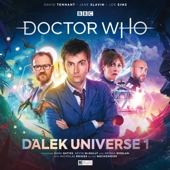 |
Dalek Universe
(John Dorney and Andrew Smith) |
|
 As time went on, The Doctor also began to become increasingly aware of his own approaching death, beginning with his confrontation with Jackson Lake - Lake’s initial belief that he was The Doctor reinforcing for the Tenth Doctor the idea that he too would regenerate some day ("The Next Doctor") -, and then being reinforced by the cryptic warning from a psychic that someone was coming for him from the darkness ("Planet of the Dead"). His own epiphany after being confronted about his arrogance after the suicide of his new friend Adelaide Brooke - The Doctor having saved her after telling her that history recorded her death, Adelaide coldly informing him that nobody should have that kind of power - left The Doctor horrified at how he had almost begun to take steps to become the monster he’d always fought, his subsequent ‘vision’ of an Ood revealing to him that his end was coming. He attempted to escape this for a time by travelling around to deal with various loose ends, such as visiting planets he’d always wanted to see, but this led to a particularly difficult period where The Doctor was trapped in the pre-Time War universe because he brought himself there to stop dangerous time-travel experiments ("Dalek Universe"). With the TARDIS still in the post-Time War universe, he subsequently spent some time with his past companion Anya Kingdom and her partner Mark Seven as he tried to find another working time machine. This led to the discovery that the Movellans ("Destiny of the Daleks") were based on Mark’s design after he was nearly destroyed and his programming wiped, culminating in The Doctor departing in a stolen Dalek time machine believing that Anya was dead (in reality she survived and joined Earth’s current anti-Dalek forces). As time went on, The Doctor also began to become increasingly aware of his own approaching death, beginning with his confrontation with Jackson Lake - Lake’s initial belief that he was The Doctor reinforcing for the Tenth Doctor the idea that he too would regenerate some day ("The Next Doctor") -, and then being reinforced by the cryptic warning from a psychic that someone was coming for him from the darkness ("Planet of the Dead"). His own epiphany after being confronted about his arrogance after the suicide of his new friend Adelaide Brooke - The Doctor having saved her after telling her that history recorded her death, Adelaide coldly informing him that nobody should have that kind of power - left The Doctor horrified at how he had almost begun to take steps to become the monster he’d always fought, his subsequent ‘vision’ of an Ood revealing to him that his end was coming. He attempted to escape this for a time by travelling around to deal with various loose ends, such as visiting planets he’d always wanted to see, but this led to a particularly difficult period where The Doctor was trapped in the pre-Time War universe because he brought himself there to stop dangerous time-travel experiments ("Dalek Universe"). With the TARDIS still in the post-Time War universe, he subsequently spent some time with his past companion Anya Kingdom and her partner Mark Seven as he tried to find another working time machine. This led to the discovery that the Movellans ("Destiny of the Daleks") were based on Mark’s design after he was nearly destroyed and his programming wiped, culminating in The Doctor departing in a stolen Dalek time machine believing that Anya was dead (in reality she survived and joined Earth’s current anti-Dalek forces).
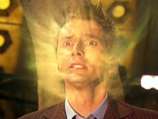 |
| The End of Time |
|
 When he finally travelled to the Ood homeworld, The Doctor learned of The Master’s latest attempt to cheat death, his old friend-turned-foe reborn in a corrupted body due to the resurrection process having been interrupted. Working with Donna’s grandfather, Wilfred Mott, The Doctor managed to find The Master, but was too late to stop his old enemy using alien healing technology to turn the entire human race into duplicates of himself by overwriting their DNA with his own... and, with this amplification of the drums The Master had always heard in his head, the Time Lords who had planted that signal in the young Master's mind on the last day of the Time War were able to escape the time lock that had imprisoned them in that time frame, the Lord President vowing that he would see creation end as the fury of the Time War annihilated reality rather than allow Gallifrey to fall and the Time Lords to die. Although The Doctor was able to destroy the transmitter that would have brought Gallifrey back into the universe - The Master subsequently sacrificing himself in an enraged attack upon the President as the Time Lords returned to Gallifrey, this action resulting in humanity being restored as the template ‘snapped’ -, The Doctor was subsequently forced to expose himself to a lethal dose of radiation in order to save Wilf, beginning a gradual but inevitable cellular collapse. As his body began to die, The Doctor paid a last brief visit to each of his incarnation’s companions - saving the now-married Mickey and Martha from a Sontaran, rescuing Sarah Jane Smith’s son Luke from a car accident, pointing the depressed Jack Harkness towards a likely partner, leaving Donna a winning lottery ticket on her wedding day, and even briefly dropping in to the Powell Estate to see Rose before she met his previous self -, before he finally regenerated in the TARDIS, his current ‘song’ coming to an end even as the Ood appeared to him one last time to assure him that the story would continue. This Doctor would even receive an unconventional ‘return’ when the Fourteenth Doctor was essentially the physical double of this incarnation ("The Power of The Doctor"), although this Doctor looked physically older than the Tenth and had various subtle personality traits that differed from his previous self. When he finally travelled to the Ood homeworld, The Doctor learned of The Master’s latest attempt to cheat death, his old friend-turned-foe reborn in a corrupted body due to the resurrection process having been interrupted. Working with Donna’s grandfather, Wilfred Mott, The Doctor managed to find The Master, but was too late to stop his old enemy using alien healing technology to turn the entire human race into duplicates of himself by overwriting their DNA with his own... and, with this amplification of the drums The Master had always heard in his head, the Time Lords who had planted that signal in the young Master's mind on the last day of the Time War were able to escape the time lock that had imprisoned them in that time frame, the Lord President vowing that he would see creation end as the fury of the Time War annihilated reality rather than allow Gallifrey to fall and the Time Lords to die. Although The Doctor was able to destroy the transmitter that would have brought Gallifrey back into the universe - The Master subsequently sacrificing himself in an enraged attack upon the President as the Time Lords returned to Gallifrey, this action resulting in humanity being restored as the template ‘snapped’ -, The Doctor was subsequently forced to expose himself to a lethal dose of radiation in order to save Wilf, beginning a gradual but inevitable cellular collapse. As his body began to die, The Doctor paid a last brief visit to each of his incarnation’s companions - saving the now-married Mickey and Martha from a Sontaran, rescuing Sarah Jane Smith’s son Luke from a car accident, pointing the depressed Jack Harkness towards a likely partner, leaving Donna a winning lottery ticket on her wedding day, and even briefly dropping in to the Powell Estate to see Rose before she met his previous self -, before he finally regenerated in the TARDIS, his current ‘song’ coming to an end even as the Ood appeared to him one last time to assure him that the story would continue. This Doctor would even receive an unconventional ‘return’ when the Fourteenth Doctor was essentially the physical double of this incarnation ("The Power of The Doctor"), although this Doctor looked physically older than the Tenth and had various subtle personality traits that differed from his previous self.
|
|

